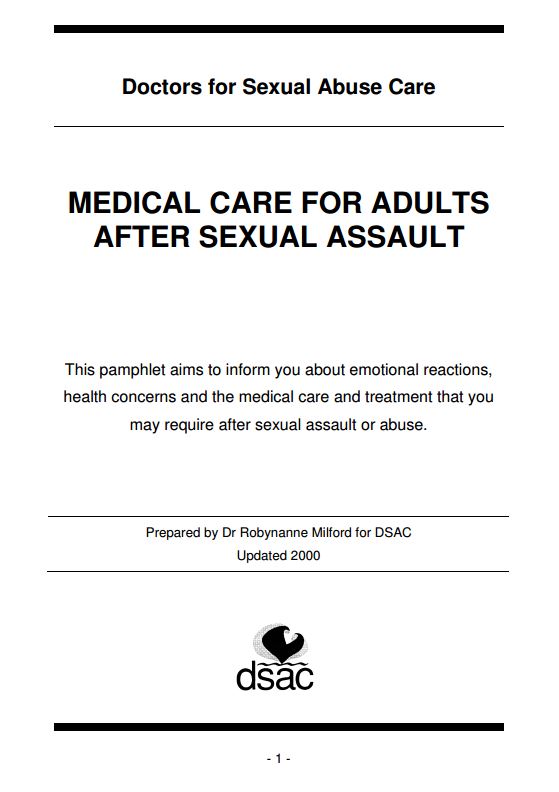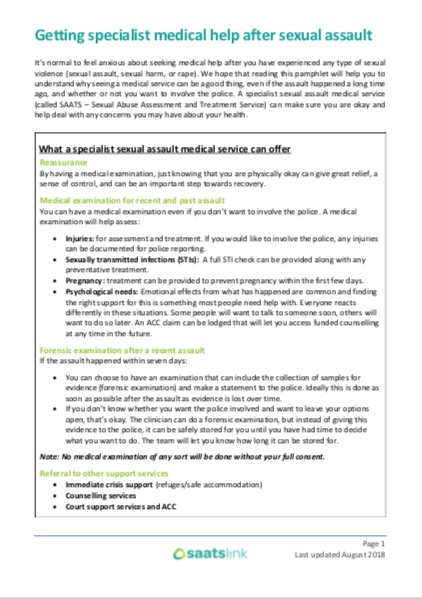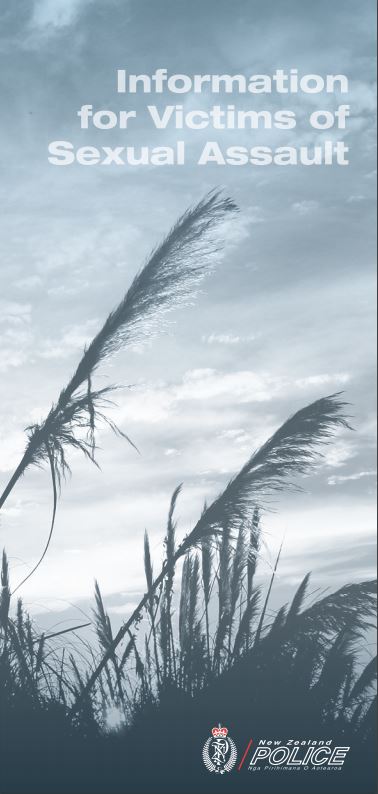Sexual assault also known as sexual violation
Key points about sexual assault
- Sexual assault (sexual violation) is any sexual contact without consent.
- It includes rape, attempted rape and any other kind of forced sexual act (kissing, touching, oral sex, taking pictures).
- It can affect people of all genders, ages, cultures and backgrounds.

- Women are much more likely than men to be sexually assaulted, but it also happens to men.
- Often, the person who commits the assault is someone you know.
- Sexual assault is never your fault.
- It is your choice whether you want to report it to the police.
- Unfortunately, sexual assault is quite common and most crimes are not reported
- Recovering from a sexual assault can take time, but there is help for you even if it happened a long time ago.
|
A note on child sexual abuse |
|---|
|
Child sexual abuse occurs when a child under 16 years old is used by an adult or older child in a sexual way. Children don’t usually report the abuse directly, especially as it tends to be carried out by someone they trust. Look out for these things: Physical signs:
Behavioural signs:
If you suspect a child is being abused, contact Oranga Tamariki on 0508 FAMILY (0508 326 459) where you can speak to a trained social worker. |
Consent is required when 2 people agree to take part in sexual activity. Without consent from both people, sexual activity is illegal. In New Zealand, you must be over 16 years of age to consent to sexual activity.
Consent is an agreement, not just the absence of saying no. Consent is often established with talking and body language. Consent cannot be given if you are asleep, unconscious, too drunk or high on drugs.
Consent is a continuous process – just because you said yes initially, it doesn’t mean you can’t change your mind. And just because you have had sex with this person in the past, this doesn’t guarantee consent to sex in the future. Consent must be given freely without pressure or coercion from the other person.
Read more about consent.
Remember, if you have been sexually assaulted, it’s not your fault. The responsibility for sexual assault lies with the person who did it. It doesn’t matter whether you had been drinking, were out late at night, what kind of clothes you were wearing or if you had agreed to go out on a date with them.
It’s normal to feel upset, scared, angry, numb or shut down, and you might also feel disbelief, humiliation, disgust, guilt, regret, self-blame and want to keep it a secret. Talking about it with someone can help you work through these feelings.
Get help from your doctor
It’s a good idea to see your doctor so they can treat any injuries and protect you against unwanted pregnancy and sexually transmitted infections. They may also refer you to a specialised doctor to collect forensic evidence in case you decide to report the assault to the police.
You are in charge of your body, and you can say no to any part of the examination. They may prescribe medication to stop an unwanted pregnancy or sexually transmitted infection. You may need to go to a follow-up appointment with your doctor to see if the medications have worked and to talk about what support you need.
Decide whether to report the assault to the police
It’s your choice whether or not to report your sexual assault to the police. If you decide to, you can take someone with you as a support person. The police can also help to arrange a medical assessment and make sure you have all the support you need.
If you are over 16 years old, you can see a doctor without having to report your assault – many are not reported and it’s up to you whether you do or not.
Get some support
Tell someone you trust – a friend, family/whānau member, teacher or church leader. Let them be there for you. You might not know what you need at times, but at least you have someone you can talk to when you need to.
Talk to a professional
It can also help to talk about what has happened with a counsellor or psychotherapist. They are used to helping people through these kind of experiences. You can do this straight away or many years later. There is free support available for you funded by ACC. Read about ACC's sexual assault support(external link).
As well as any injuries and distress at the time, over time you might start to experience PTSD, depression, anxiety or thoughts about suicide. If this happens, it’s important to get help as soon as you notice yourself feeling this way.
Look after yourself
Take good care of yourself while you are recovering by:
- getting plenty of sleep
- eating nourishing food
- doing gentle exercise
- spending time with close friends
- doing relaxing activities, such as baths, walks, good books and soothing music
- avoiding alcohol and drugs.
Contact one of these specialised organisations for support:
Safe to talk(external link) 24/7 free and confidential helpline. Phone 0800 044334 or text 4334.
ACC sensitive claims(external link) Funded counselling options.
Family Action(external link) free services in West Auckland for those who have experienced abuse, trauma, family and sexual violence.
NZ Police(external link) Advice about what you can do after an assault.
Rape Crisis(external link) A non-profit, community agency that supports survivors of sexual violence to progress towards healing. Phone 0800 88 33 00.
Rape Prevention Education(external link) Free support and counselling to survivors of rape and sexual abuse.
Sexual Abuse Help Foundation(external link) Support for survivors in Wellington and Auckland for people of all ages and genders. 24/7 free crisis support line: Auckland(external link) 09 623 1700 Wellington(external link) 04 801 6655.
Sexual Abuse Prevention Network(external link) Education and advice with the goal of ending sexual abuse.
The Harbour(external link) An online information hub for survivors, those who have harmed and family/whānau and friends.
Victims' information(external link) A website developed by the Ministry of Justice to help support victim-survivors of sexual violence through the court process and to help them make informed choices about the actions they take after they've experienced sexual violence.
Wellington HELP(external link) Free support for anyone who has been affected by sexual violence in the Wellington region.
Sexual assault can happen to anyone, but it’s never the victim’s fault. Everyone can play a part in stopping a sexual assault by looking out for each other and knowing how and when to intervene.
Keeping yourself safe is just as important as helping someone in trouble, so it’s good to have some ideas about what to do if you see someone at risk.
Here are our top 5 tips for helping prevent a sexual assault:
1. Keep an eye on your friends
When you’re out with friends, make sure you stay together and come home together. Don’t let a friend go home with someone they don’t know. Keep an eye on who your friends are talking with and if you think a friend is getting into an uncomfortable situation, try to interrupt. This can be as simple as going over and asking them to come to the bathroom with you.
2. Be aware of other people around you
You might notice someone on their own who has had too much to drink, or you might see someone walking by themselves at the end of the night. Check if they are okay and offer to walk with them or call them a taxi.
3. Trust your instincts
Sometimes you get a gut feeling that “something isn’t right”. If you see someone in trouble, ask them directly “are you okay?” or “do you need some help?”. If they are someone you don’t know or the situation makes you uncomfortable, a group of you can talk to them together.
4. Know that you can make a difference
It can be hard to interrupt a situation, especially if it’s with people you don’t know. But remember, you can make all the difference between someone getting home safely and someone being a victim of a sexual assault.
5. Call the police
If you witness a sexual assault or if you see a situation that you don’t feel comfortable intervening in, call the police.
Consent(external link) BodySafe, NZ
Support services for sexual abuse in Auckland(external link) HELP Auckland, NZ
Sexual assault statistics(external link) Rape Prevention Education, NZ
Advice for victims(external link) NZ Police
Your options [PDF, 370 KB] SAATS Link, NZ
Getting specialist medical help after sexual assault [PDF, 235 KB] SAATS Link, NZ
Sexual abuse(external link) Oranga Tamariki, NZ
Apps
First aid and emergency apps
Mental health and wellbeing apps
Resources
Information for victims of sexual assault (external link)NZ Police
Medical care for adults after sexual assault – patient booklet (external link)Doctors for Sexual Abuse Care, 2000
Your options – sexual assault service for adult and adolescents [PDF, 370 KB]SAATS Link, NZ, 2017
Getting specialist medical help after sexual assault [PDF, 235 KB]SAATS Link, NZ, 2018
References
- Fergusson DM, McLeod GFH, Horwood LJ. Childhood sexual abuse and adult developmental outcomes – findings from a 30-year longitudinal study in NZ(external link) Child Abuse & Neglect. 2013 Sept; 37(4): 664–674.
- Post-traumatic stress disorder management(external link) National Institute for Health Care and Excellence, UK, 2005
- Sexual violence research and data(external link) Ministry of Justice, NZ
- Latest crime survey reveals surprising high levels of unreported sexual violence(external link) Ministry of Justice, NZ, 2020
Consultation
- Take a brief history to help decide on next steps and attend to any acute mental or physical health concerns.
- If the sexual assault occurred with the past 36 hours, it is important to preserve forensic evidence, even if they aren’t sure yet where they want to report the assault. Advise the patient not to eat or drink anything, avoid brushing teeth, showering/bathing, passing urine or wiping genitals.
- Contact your local Sexual Assault Assessment and Treatment team (SAATS)(external link).
- Advise of specialist support services and ACC-subsidised counselling
- For adolescents, consider confidentiality and privacy, assess safety and decide about reporting to Child Youth and Family (CYF)
- Consider possible sexual assault if a patient has sexual or genital health concerns, requested emergency contraception, been physically assaulted, been drunk or drugged, or unconscious or injured.
Resources
Sexually transmitted infections – summary of guidelines(external link) NZ Sexual Health Society
Sexual Abuse Assessment and Treatment Service (SAATS)(external link) ACC-funded medical service for patients (children, adolescents and adults) who have experienced sexual abuse/assault. To become a contracted vendor for these service go to the website.
A “how-to guide” for a sexual health check-up(external link) BPAC, NZ, 2013
Detecting child abuse in general practice(external link) BPAC, NZ, 2011
HEEADSSS in five minutes(external link) Podcast, Goodfellow Unit, NZ
Adolescent consultation and the HEADSSS assessment(external link) Starship, NZ, 2022
The HEADSSS assessment sample questions(external link) Whāraurau, NZ, 2021
Continuing professional development
Recognition and response to sexual assault and intimate partner violence in primary care(external link)
1. Video: PHARMAC seminar : Recognition and response to intimate partner violence, part 1 – Dr Clare Healy (30 minutes)
This video may take a few moments to load.
(PHARMAC Seminar, NZ, 2018)
Video: PHARMAC seminar : Recognition and response to intimate partner violence, part 2 – Dr Clare Healy (31 minutes)
This video may take a few moments to load.
(PHARMAC Seminar, NZ, 2018)
2. Video: PHARMAC seminar : Family violence in New Zealand: Responding to positive disclosures, part 1 – Dr Clare Healy (25 minutes)
This video may take a few moments to load.
(PHARMAC Seminar, NZ, 2018)
Video: PHARMAC seminar : Family violence in New Zealand: Responding to positive disclosures, part 2 – Dr Clare Healy (21 minutes)
This video may take a few moments to load.
(PHARMAC Seminar, NZ, 2018)
3. Video: PHARMAC seminar : Sexual assault in NZ, part 1– Dr Cathy Stephenson (37 minutes)
This video may take a few moments to load.
(PHARMAC Seminar, NZ, 2018)
Video: PHARMAC seminar : Sexual assault in NZ, part 2– Dr Cathy Stephenson (33 minutes)
This video may take a few moments to load.
(PHARMAC Seminar, NZ, 2018)
For more videos in the same series, visit PHARMAC seminars(external link).
Apps
First aid and emergency apps
Mental health and wellbeing apps
Brochures

Doctors for Sexual Abuse Care, 2000

SAATS Link, NZ, 2018
Credits: Healthify editorial team. Healthify is brought to you by Health Navigator Charitable Trust.
Reviewed by: Dr Phoebe Hunt, sexual health registrar, Auckland DHB
Last reviewed:
Page last updated:






